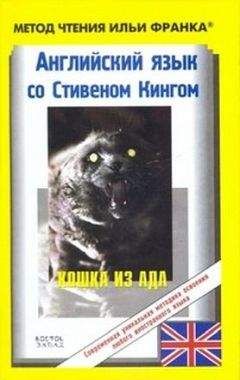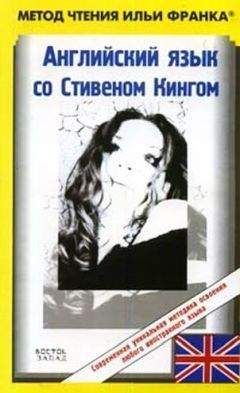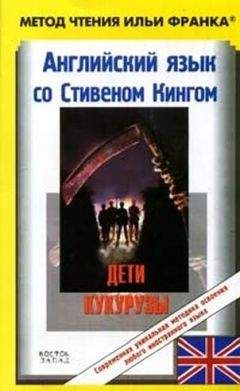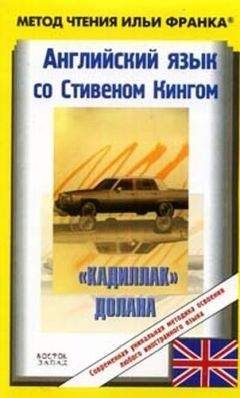Stephen King - Английский язык с С. Кингом "Верхом на пуле"
“Why wouldn't he call home?” It was my mouth, talking all by itself. My brain was frozen. “He's gone for two weeks on a business trip and he never calls home once to see how his wife's doing?”
“Well (ну),” the driver said, “that's sorta beside the point (смысл не в этом: «это вроде как вне сути/смысла = к делу не относится»; sorta — /разг., искаж. sort of/ как бы, вроде; point — точка; пункт; суть, смысл), wouldn't you say (так ведь)? I mean hey, what a bargain — that's the point (я имею в виду, что за сделка, вот в чем суть; bargain — торговая сделка; выгодная покупка; дешево купленная вещь). Who wouldn't be tempted (кто бы не соблазнился)? After all, you could always drive the car with the fuckin windows open, right (в конце концов, можно всегда вести машину, с открытыми, к черту, окнами, верно)? And it's basically just a story (и, вообще, это просто история). Fiction (выдумка). I thought of it because of the smell in this car (я подумал о ней из-за запаха в машине). Which is fact (что является фактом).”
Silence (тишина). And I thought (и я подумал): He's waiting for me to say something (он ждет, чтобы я сказал что-то), waiting for me to end this (ждет, чтобы я закончил это). And I wanted to (и я хотел /сделать это/). I did (правда хотел). Except... what then (но… что потом)? What would he do then (что он сделает потом)?
basically ['beIsIk(q)lI], fiction ['fIkS(q)n], silence ['saIlqns]
“Well,” the driver said, “that's sorta beside the point, wouldn't you say? I mean hey, what a bargain — that's the point. Who wouldn't be tempted? After all, you could always drive the car with the fuckin windows open, right? And it's basically just a story. Fiction. I thought of it because of the smell in this car. Which is fact.”
Silence. And I thought: He's waiting for me to say something, waiting for me to end this. And I wanted to. I did. Except... what then? What would he do then?
He rubbed the ball of his thumb over the button on his shirt (он потер подушечкой большого пальца значок на рубашке), the one reading i rode the bullet at thrill village, laconia (тот, на котором написано “я катался на Пуле в деревне развлечений в Лаконии”). I saw there was dirt under his fingernails (я увидел грязь под ногтями его пальцев). “That's where I was today (вот где я был сегодня),” he said. “Thrill Village (в деревне развлечений). I did some work for a guy (я делал кое-какую работу для /одного/ парня) and he gave me an all-day pass (и он дал мне билет на целый день; pass — проход; пропуск; контрамарка, бесплатный билет). My girlfriend was gonna go with me (моя подружка собиралась пойти со мной; gonna = going to), but she called and said she was sick (но она позвонила и сказала, что больна), she gets these periods that really hurt sometimes (у нее /опять/ эти месячные, которые иногда по-настоящему/очень болят; period — период; цикл; /мн. ч./ менструация), they make her sick as a dog (от них она чувствует себя совсем погано: «они делают ее больной как собака»). It's too bad, but I always think, hey, what's the alternative (это очень плохо, но я всегда думаю, какова же альтернатива)? No rag at all, right, and then I'm in trouble, we both are (она вся на взводе, верно, и тогда у меня проблемы, у нас обоих /проблемы/; rag — лоскут; тряпье; to lose one's rag — разозлиться, выйтиизсебя; trouble — беспокойство; неприятность).” He yapped, a humorless bark of sound (он испустил короткий смешок — невеселый звук, похожий на лай; to yap — взвизгнуть; лаять, тявкать; bark — лай; лающийзвук; резкийилиотрывистыйзвук). “So I went by myself (и я поехал один). No sense wasting an all-day pass (никакого смысла терять билет на целый день; to waste — терятьдаром; тратитьвпустую). You ever been to Thrill Village (ты когда-нибудь был в деревне развлечений)?”
fingernail ['fINgqneIl], alternative [Ll'tWnqtIv], yap [jxp]
He rubbed the ball of his thumb over the button on his shirt, the one reading i rode the bullet at thrill village, laconia. I saw there was dirt under his fingernails. “That's where I was today,” he said. “Thrill Village. I did some work for a guy and he gave me an all-day pass. My girlfriend was gonna go with me, but she called and said she was sick, she gets these periods that really hurt sometimes, they make her sick as a dog. It's too bad, but I always think, hey, what's the alternative? No rag at all, right, and then I'm in trouble, we both are. He yapped, a humorless bark of sound. So I went by myself. No sense wasting an all-day pass. You ever been to Thrill Village?”
“Yes,” I said. “Once (один раз). When I was twelve (когда мне было двенадцать).”
“Who'd you go with (с кем ты ходил)?” he asked. “You didn't go alone, did you (ты ходил не один, правда)? Not if you were only twelve (нет, если тебе было только двенадцать).”
I hadn't told him that part, had I (я не рассказывал ему эту часть = про возраст, ведь так)? No. He was playing with me, that was all (он играл со мной, вот и все), swatting me idly back and forth (лениво перебрасывая меня взад и вперед; to swat — ударять; бить /сильным ударом/). I thought about opening the door and just rolling out into the night (я подумывал о том, чтобы открыть дверь и просто выкатиться в ночь), trying to tuck my head into my arms before I hit (старясь спрятать голову в руках, прежде чем ударюсь; to tuck — подгибать, подворачивать; подбирать под себя; засовывать, прятать), only I knew he'd reach over and pull me back before I could get away (но я знал, что он потянется за мной и втянет обратно /в машину/, прежде чем я смогу выбраться). And I couldn't raise my arms, anyway (и я не мог поднять руки в любом случае). The best I could do was clutch my hands together (лучшее, что я мог сделать = все, что я мог, — это сжимать руки вместе).
idly ['aIdlI], raise [reIz], anyway ['enIweI]
“Yes, I said. Once. When I was twelve.”
“Who'd you go with?” he asked. “You didn't go alone, did you? Not if you were only twelve.”
I hadn't told him that part, had I? No. He was playing with me, that was all, swatting me idly back and forth. I thought about opening the door and just rolling out into the night, trying to tuck my head into my arms before I hit, only I knew he'd reach over and pull me back before I could get away. And I couldn't raise my arms, anyway. The best I could do was clutch my hands together.
“No,” I said. “I went with my dad (я ходил/ездил с отцом). My dad took me (отец отвел/возил меня).
“Did you ride the Bullet (ты катался на “Пуле”)? I rode that fucker four times (я катался на этой чертовой штуке четыре раза). Man! It goes right upside down (это круто, она прямо переворачивается; to go upside down — переворачиваться вверх дном)!” He looked at me and uttered another empty bark of laughter (он посмотрел на меня и издал еще один пустой смешок, похожий на лай). The moonlight swam in his eyes (лунный свет заполнял его глаза: «плавал в его глазах»; to swim), turning them into white circles (превращая их в белые круги), making them into the eyes of a statue (превращая их в глаза статуи). And I understood he was more than dead (и я понял, что он был не просто мертвый: «больше, чем мертвый»); he was crazy (он был сумасшедший). “Did you ride that, Alan (ты катался на ней, Алан)?”
right [raIt], utter ['Atq], statue ['stxtjH]
“No,” I said. “I went with my dad. My dad took me.”
“Did you ride the Bullet? I rode that fucker four times. Man! It goes right upside down!” He looked at me and uttered another empty bark of laughter. The moonlight swam in his eyes, turning them into white circles, making them into the eyes of a statue. And I understood he was more than dead; he was crazy. “Did you ride that, Alan?”
I thought of telling him he had the wrong name (я думал = собирался сказать ему, что он назвал неправильное имя), my name was Hector (мое имя Гектор), but what was the use (но какой смысл; use — использование; польза, толк)? We were coming to the end of it now (сейчас мы подходили к концу /всего/ этого = к развязке).
“Yeah,” I whispered (прошептал). Not a single light out there except for the moon (ни единого огонька снаружи, кроме /света/ луны). The trees rushed by (деревья проносились мимо), writhing like spontaneous dancers at a tent-show revival (извиваясь, как стихийные танцоры на сектантском молитвенном собрании; tent show — циркшапито; revival — возрождение; духовноепробуждение/особенновпротестантизме/; tent-show revival — молитвенноесобраниеевангелистовидр., сопровождаемоесостояниемвозбуждения, музыкой, танцами, раньшечастоустраивалисьподбрезентовымитентами). The road rushed under us (дорога проносилась под нами). I looked at the speedometer (я посмотрел на спидометр) and saw he was up to eighty miles an hour (и увидел, что он разогнался до восьмидесяти миль в час). We were riding the bullet right now, he and I (мы ехали на пуле прямо сейчас, он и я); the dead drive fast (мертвецы ездят быстро). “Yeah, the Bullet (да, “Пуля”). I rode it (я ездил на ней).”




